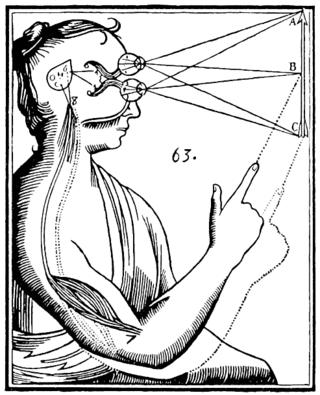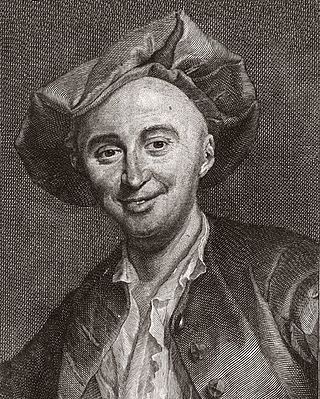
Consciousness, at its simplest, is awareness of internal and external existence. However, its nature has led to millennia of analyses, explanations and debate by philosophers, theologians, and all of science. Opinions differ about what exactly needs to be studied or even considered consciousness. In some explanations, it is synonymous with the mind, and at other times, an aspect of mind. In the past, it was one's "inner life", the world of introspection, of private thought, imagination and volition. Today, it often includes any kind of cognition, experience, feeling or perception. It may be awareness, awareness of awareness, or self-awareness either continuously changing or not. The disparate range of research, notions and speculations raises a curiosity about whether the right questions are being asked.
Epiphenomenalism is a position on the mind–body problem which holds that physical and biochemical events within the human body are the sole cause of mental events. According to this view, subjective mental events are completely dependent for their existence on corresponding physical and biochemical events within the human body, yet themselves have no influence over physical events. The appearance that subjective mental states influence physical events is merely an illusion. For instance, fear seems to make the heart beat faster, but according to epiphenomenalism the biochemical secretions of the brain and nervous system —not the experience of fear—is what raises the heartbeat. Because mental events are a kind of overflow that cannot cause anything physical, yet have non-physical properties, epiphenomenalism is viewed as a form of property dualism.
French materialism is the name given to a handful of French 18th-century philosophers during the Age of Enlightenment, many of them clustered around the salon of Baron d'Holbach. Although there are important differences between them, all of them were materialists who believed that the world was made up of a single substance, matter, the motions and properties of which could be used to explain all phenomena.

Sir Karl Raimund Popper was an Austrian–British philosopher, academic and social commentator. One of the 20th century's most influential philosophers of science, Popper is known for his rejection of the classical inductivist views on the scientific method in favour of empirical falsification. According to Popper, a theory in the empirical sciences can never be proven, but it can be falsified, meaning that it can be scrutinised with decisive experiments. Popper was opposed to the classical justificationist account of knowledge, which he replaced with critical rationalism, namely "the first non-justificational philosophy of criticism in the history of philosophy".
Materialism is a form of philosophical monism which holds that matter is the fundamental substance in nature, and that all things, including mental states and consciousness, are results of material interactions of material things. According to philosophical materialism, mind and consciousness are by-products or epiphenomena of material processes, without which they cannot exist. Materialism directly contrasts with idealism, according to which consciousness is the fundamental substance of nature.

René Descartes was a French philosopher, scientist, and mathematician, widely considered a seminal figure in the emergence of modern philosophy and science. Mathematics was central to his method of inquiry, and he connected the previously separate fields of geometry and algebra into analytic geometry. Descartes spent much of his working life in the Dutch Republic, initially serving the Dutch States Army, later becoming a central intellectual of the Dutch Golden Age. Although he served a Protestant state and was later counted as a Deist by critics, Descartes was Roman Catholic.

In many religious and philosophical traditions, the soul is the spiritual essence of a person, which includes one's identity, personality, and memories, an immaterial aspect or essence of a living being that is believed to be able to survive physical death. The concept of the soul is generally applied to humans, though it can also be applied to other living or even non-living entities, as in animism.

Nicolas Malebranche was a French Oratorian Catholic priest and rationalist philosopher. In his works, he sought to synthesize the thought of St. Augustine and Descartes, in order to demonstrate the active role of God in every aspect of the world. Malebranche is best known for his doctrines of vision in God, occasionalism and ontologism.

In the philosophy of mind, mind–body dualism denotes either the view that mental phenomena are non-physical, or that the mind and body are distinct and separable. Thus, it encompasses a set of views about the relationship between mind and matter, as well as between subject and object, and is contrasted with other positions, such as physicalism and enactivism, in the mind–body problem.
Indeterminism is the idea that events are not caused, or are not caused deterministically.
The year 1748 in science and technology involved some significant events.

Julien Offray de La Mettrie was a French physician and philosopher, and one of the earliest of the French materialists of the Enlightenment. He is best known for his 1747 work L'homme machine.
Evolutionary epistemology refers to three distinct topics: (1) the biological evolution of cognitive mechanisms in animals and humans, (2) a theory that knowledge itself evolves by natural selection, and (3) the study of the historical discovery of new abstract entities such as abstract number or abstract value that necessarily precede the individual acquisition and usage of such abstractions. As a branch of inquiry in epistemology, evolutionary epistemology lies at the crossroads of philosophy and evolutionary biology.

The mind–body problem is a philosophical problem concerning the relationship between thought and consciousness in the human mind, and the body.
Animal machine or bête-machine, is a philosophical notion from Descartes in the 17th century who held that animal behaviour can be compared to the one of machines. Like them, animals would be an assembly of mechanical pieces and therefore unable to think and not gifted of consciousness, although they differ by their living character and ability of feeling. This implied a fundamental difference between animals and humans, but Man a Machine by Julien Offray de La Mettrie, first published in 1747, extended Descartes' argument to humans.
Interactionism or interactionist dualism is the theory in the philosophy of mind which holds that matter and mind are two distinct and independent substances that exert causal effects on one another. An example of your mind influencing your body would be if you are depressed, you can observe the effects on your body, such as a slouched posture, a lackluster smile, etc. Another example, this time of your body affecting your mind would be: If you struck your toe very forcefully on a door, you would experience terrible pain. Interactionism is one type of dualism, traditionally a type of substance dualism though more recently also sometimes a form of property dualism. Many philosophers and scientists have responded to this theory with arguments both supporting and opposing its relevance to life and whether the theory corresponds to reality.
This is a list of philosophical literature articles.
Mechanism is the belief that natural wholes are similar to complicated machines or artifacts, composed of parts lacking any intrinsic relationship to each other.
The von Neumann–Wigner interpretation, also described as "consciousness causes collapse", is an interpretation of quantum mechanics in which consciousness is postulated to be necessary for the completion of the process of quantum measurement.

Gertrude Carman Bussey was an American academic philosopher and activist for women's rights, civil liberties, and peace.








